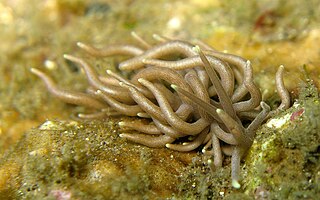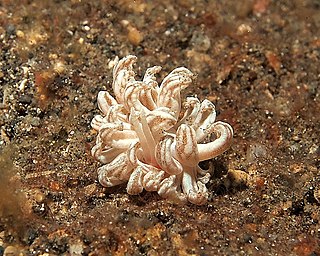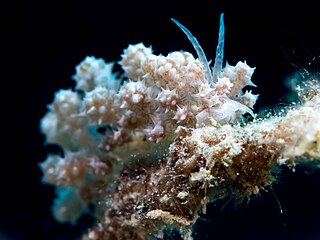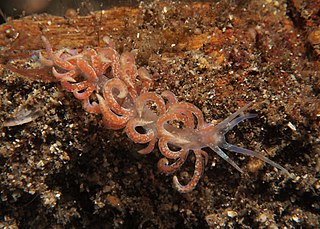
Phyllodesmium briareum is a species of sea slug, an aeolid nudibranch, a marine gastropod mollusc in the family Facelinidae.

Phyllodesmium is a genus of predatory sea slugs, aeolid nudibranchs, marine gastropod molluscs in the family Facelinidae.

Phyllodesmium longicirrum, common name the solar-powered phyllodesmium, is a species of sea slug, an aeolid nudibranch, a marine gastropod mollusc in the family Facelinidae.

Phyllodesmium crypticum is a species of sea slug, an aeolid nudibranch, a marine gastropod mollusc in the family Facelinidae.
William B. "Bill" Rudman is a malacologist from New Zealand and Australia. In particular he studies sea slugs, opisthobranch gastropod molluscs, and has named many species of nudibranchs.

Ercolania is a genus of small sacoglossan sea slugs, shell-less marine opisthobranch gastropod mollusks in the family Limapontiidae.

Phyllodesmium rudmani is a species of sea slug, an aeolid nudibranch, a marine gastropod mollusc in the family Facelinidae.

Phyllodesmium colemani is a species of sea slug, an aeolid nudibranch, a marine gastropod mollusc in the family Facelinidae.
Phyllodesmium hyalinum is a species of sea slug, an aeolid nudibranch, a marine gastropod mollusc in the family Facelinidae.

Phyllodesmium iriomotense is a species of sea slug, an aeolid nudibranch, a marine gastropod mollusc in the family Facelinidae.

Phyllodesmium jakobsenae is a species of sea slug, an aolid nudibranch, a marine gastropod mollusk in the family Facelinidae.

Phyllodesmium macphersonae is a species of sea slug, an aeolid nudibranch, a marine gastropod mollusc in the family Facelinidae.

Phyllodesmium magnum is a species of sea slug, an aeolid nudibranch, a marine gastropod mollusc in the family Facelinidae.

Phyllodesmium opalescens is a species of sea slug, an aeolid nudibranch, a marine gastropod mollusc in the family Facelinidae.
Phyllodesmium parangatum is a species of sea slug, an aeolid nudibranch, a marine gastropod mollusc in the family Facelinidae.
Phyllodesmium pecten is a species of sea slug, an aeolid nudibranch, a marine gastropod mollusc in the family Facelinidae.

Phyllodesmium acanthorhinum is a species of sea slugs, an aeolid nudibranch, a marine gastropod mollusc in the family Facelinidae.

Phyllodesmium koehleri is a species of sea slug, an aeolid nudibranch, a marine gastropod mollusc in the family Facelinidae.
Phyllodesmium lembehense is a species of sea slug, an aeolid nudibranch, a marine gastropod mollusc in the family Facelinidae.

Phyllodesmium poindimiei is an Alcyonacea feeding, aeolid nudibranch Gastropod belonging to the family Facelinidae. Cerata are important in this clade in terms of their physical defense and efficient metabolic processes. This species is spread sporadically along tropical coastal regions such as Australia, Hawaii, and the Indo-Pacific living in diverse marine habitats such as coral reefs. Unlike other species in the Opisthobranch Mollusca clade, P. poindimiei’s lush pink cerata are used for defensive purposes other than Nematocyst (dinoflagellate) capture and toxin release. Organismal ties within these thriving, tropical ecosystems can be determinants of environment change, which affects massive coral ecosystems. Continuously changing marine ecosystems, such as coral reefs, are directly linked to the evolution of organisms that live and thrive in the tropics such as the soft nudibrach P. poindimiei.














